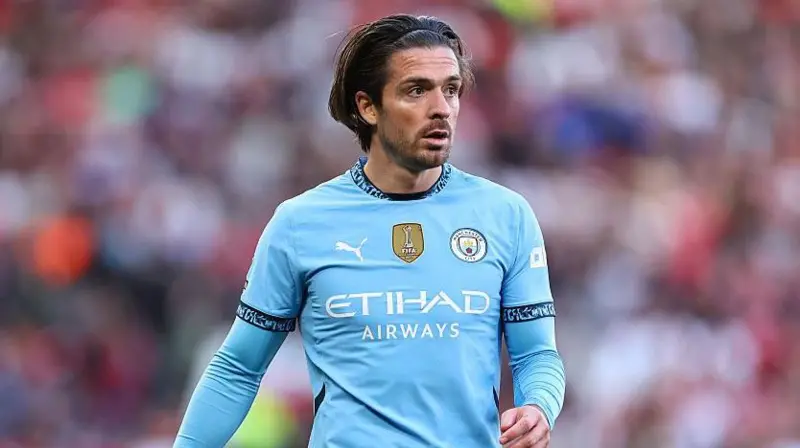
The electric atmosphere of a Manchester derby took a dark turn on Sunday when an altercation involving Manchester City’s star midfielder Jack Grealish marred the otherwise uneventful goalless draw against rivals Manchester United at Old Trafford. As the final whistle blew, signaling the end of a tense but scoreless battle, Grealish, who had entered the game as a second-half substitute, found himself at the center of an unexpected confrontation. A 20-year-old man has since been charged with assault, casting a shadow over what should have been a showcase of footballing rivalry and skill.
The incident unfolded as Grealish made his way off the pitch toward the players’ tunnel near the Stretford End, a section of the stadium known for its passionate Manchester United supporters. Reports suggest that a fan beckoned the 29-year-old England international over, perhaps under the guise of a friendly exchange. But what followed was far from amicable—Grealish was allegedly slapped in the face, a shocking act that prompted an immediate response from security and sparked a police investigation. The suspect, identified as Alfie Holt from Haven Drive in Droylsden, was swiftly apprehended and charged with assault. Authorities have confirmed that Holt is set to appear at Manchester Magistrates Court in mid-July, with the legal process now underway to address this breach of conduct.
For Grealish, the moment must have felt like a jarring echo of a past encounter. Years ago, while playing for Aston Villa, he was famously attacked by a Birmingham City fan who stormed the pitch during a match, an incident that ended with the assailant behind bars. This time, though, the City star emerged unscathed physically, with no serious injuries reported. Still, the episode adds an unfortunate footnote to what has already been a challenging season for the midfielder. Limited to just 18 Premier League appearances and recently omitted from England’s national squad, Grealish has faced scrutiny and speculation about his future at the Etihad Stadium. Yet, his resilience shines through—he came on in the 74th minute against United, replacing Ilkay Gundogan, and played his part in a match that, while lacking goals, was thick with intensity.
The derby itself was a gritty affair, a tactical stalemate that left both sides frustrated. But the post-match drama wasn’t limited to Grealish’s ordeal. Manchester City manager Pep Guardiola was vocal about another troubling aspect of the day: the behavior of some United fans. Throughout the game, sections of the Old Trafford crowd directed derogatory chants at City’s Phil Foden, targeting his mother in a display that Guardiola condemned as a “lack of class.” “The chants, to him? Lack of class. But it’s not United [the club], it’s the people,” the Spaniard remarked, his frustration palpable. He went on to lament the exposure that players, managers, and owners face in modern football, calling for those responsible to feel ashamed. The incident with Foden, coupled with the alleged assault on Grealish, painted a troubling picture of fan behavior that day.
Both Manchester clubs have remained tight-lipped, refraining from public statements as the investigation into the assault unfolds. Behind the scenes, however, it’s understood that United are cooperating fully with Greater Manchester Police to ensure justice is served. The police, for their part, acted decisively, issuing a statement that underscored the gravity of the situation: “This charge relates to an incident which took place at Old Trafford Football Club yesterday.” For Holt, the consequences are looming—he faces a court date that could reshape his future, all stemming from a fleeting moment of recklessness.
The broader implications of this episode ripple beyond the pitch. Football, a sport that thrives on passion and rivalry, occasionally teeters on the edge of excess, and this Manchester derby served as a stark reminder. Grealish, a player known for his flair and charisma, has now twice been the target of fan aggression, raising questions about player safety and the boundaries of supporter enthusiasm. Meanwhile, the rivalry between City and United—already one of the fiercest in English football—gains another layer of tension, fueled not by goals or glory, but by an off-field clash that neither side could have anticipated.
As the dust settles, the focus shifts to what comes next. For Grealish, it’s a chance to regroup and refocus, his career at a crossroads yet still brimming with potential. For the authorities and the clubs, it’s a call to reinforce the line between fervor and folly, ensuring that the beautiful game remains just that—beautiful, not blemished. And for the fans, it’s a moment to reflect on the spirit of the sport, where competition should unite rather than divide. The Manchester derby may have ended without a winner on the scoreboard, but its aftermath has left an indelible mark, one that will linger until the next chapter of this storied rivalry unfolds.
Leave a Reply